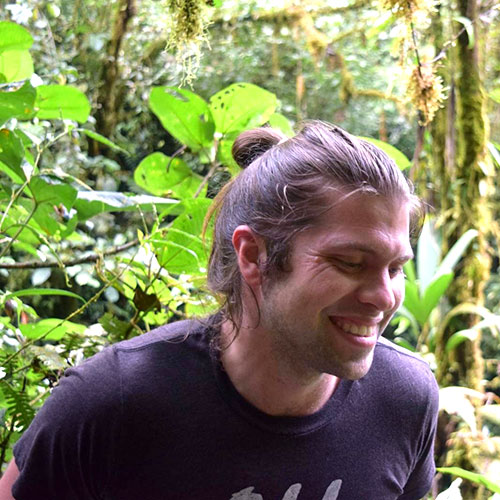LET’S DO LUDDISM
★ ★ ★ ★
RELATING IN THE TIME OF ROBOTS

Image by G. Eyosis
By Cory Massaro
Cleveland Airport is one of the more boring airports in the world. The posters on the walls mostly advertise universities outside the state of Ohio, or whose degrees can get you outside the state of Ohio, or vacation destinations as far as possible from Ohio.
I was flying from my home state of Ohio to San Francisco, California. On my way through the airport, I was also attending my father’s arraignment, which was held over Zoom. The judge appeared on my phone’s screen decked in the black robes traditional to her office.
“I don’t wanna see anybody lying down. I wanna see clothes; this is a courtroom.” She made her way down the docket. She told various people that they could no longer go to certain hardware stores or gas stations while they awaited trial. She read out bail amounts which most people in that part of Ohio couldn’t possibly pay. She read my father’s name, and no one answered.
“Well, I see another Massaro in the Zoom room. Cory? Can you tell us where he is?” I could not.
* * *
If Cleveland’s airport is a plea for help, San Francisco’s is the future. Everything is a disk. The seating areas are well-spaced circular sofas upholstered in clean-looking textures and colors, and sinuous benches that wind along the floor in pleasing arcs. There are no-touch water-refill stations, all white plastic casing and subdued blue LED displays. Objects in this airport speak and can be spoken to.
But the first thing I really saw was the robot barista, and the first thing I did was buy a coffee from them. The robot consisted of a sleek white arm housed in a glass case; the setup reminded me of the incubators on a neonate ward. Their armpit was a black accordion flange, their humerus a white shaft, their elbow a black hinge, and their hand a two-pronged fork that opened and closed to grip things. Inside the incubator, the robot kept company with an espresso machine and stacks upon stacks of compostable brown paper cups. A pair of touch screen interfaces allowed patrons to choose which specialty espresso they wanted. The year before I took this trip, the baristas at San Francisco Airport had gone on strike. The robots had appeared around the same time, which I guess made this robot a scab.
They made me an espresso shot from a specialty Peruvian Arabica bean, Bourbon varietal, fermented via the honey process. This espresso shot cost me seven dollars. It was delivered to me via a sort of airlock in the robot’s incubating chamber.
A few train rides took me from San Francisco airport to downtown San Jose, where I was visiting friends. I went to bed, and got up, and walked over to a coffee shop. In this one, the baristas were human. When I walked in the door, I saw their photos arranged on the wall. Below each photo was a list of interests and conversation topics. “I like indie rock.” “Talk to me about cats.” I wondered if these were not, also, implicitly lists of what not to talk about—a kind of totem to ward off awkwardness, developed after long experience with Silicon Valley’s creeps and undersocialized programmers.
* * *
During my time in San Jose, I did track my father down. He was in jail—in a different county from the one where he was being arraigned. He’d scattered petty crime around Ohio like dandelion seeds. The judge in Summit County didn’t know that he was locked up somewhere in Lake County.
It turned out I could do a virtual visit with him, and that, in fact, even in-person visits were now mediated by a tech platform called Securus. I went to Securus’s website: Ready to explore another opportunity on how to connect with your loved one from anywhere? There, I parted with a lot of personal data in exchange for the opportunity to schedule a video call with my father. Four dollars for twenty-five minutes. But the video chat booth at his jail wasn’t working, and he never showed.
* * *
As I left SFO, I bought another coffee from the robot barista. They waved their two-pronged arm. A small crowd surrounded the little incubator. I inspected the customization options this time. There were two varieties of beans, along with tasting notes. The arm danced and waggled up and down as my espresso dripped into the cup. “Will it give us the middle finger?” one guy joked.
The arm set my coffee on a shelf. I tapped the screen. The arm waved at me as they pushed my coffee into the little airlock that led out of the incubator. I waved back.
“You have to wave to get your coffee?” a woman asked.
“No,” I said. “You don’t have to. I just want to.”

Cory Massaro is a native of Ohio, U.S.A., now at home in Quito, Ecuador. He spends his time learning languages, writing, playing music, coding, and propagandizing. He actively opposes materialism, consumption-as-cultural mandate, and all forms of hegemony. He is in favor of small, robust communities and gently destroying hierarchies wherever he goes. His fiction and poetry draw on the grievances he has stored in his heart since working in technology; his dearest hope is to predict accurately how egalitarian, worker-centered societies will revive the oral tradition to weather the climate wars.
























0 Comments